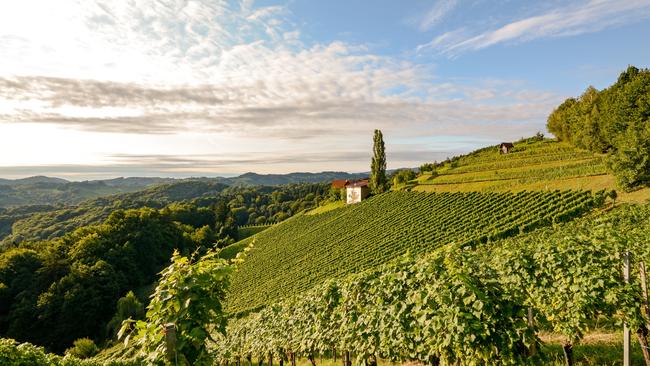Natural selection on a wine-tasting adventure in Austria
The Styria region proves the ideal place for an epiphany.

It’s the ideal setting for an epiphany. Late summer, a garden table in the shade of an ash beside a handsome farmhouse — painted sunny yellow with green shutters — in Austria’s southeastern Styria region. The scenery is a postcard of rolling hills mottled with beech forests and veined with vines all the way to Slovenia.
My hosts are four evangelical Austrians who mount a lengthy, very liquid argument to convince me, finally, of the wonders of natural wine. Or living wine, as they like to call it.
The farmhouse belongs to Maria and Sepp Muster who, along with Alice and Roland Tauss, Elisabeth and Andreas Tscheppe, Brigitte and Ewald Tscheppe, and Christine and Franz Strohmeier, comprise the collective of “individualist” winemaking friends known as Schmecke das Leben, Taste Life.
The husbands, minus Franz, have gathered to induct me into their faith.
All were established vignerons who switched to making organic, sustainable, biodynamic, minimal-intervention wines early this century. The global movement towards natural wines didn’t gain prominence until about 2010. Not coincidentally, that was the year they formed Schmecke das Leben and unveiled their living wines at the imperial palace in Vienna during Vie Vinum, Austria’s premier wine show. It did not go well.
“When we first presented, people thought we were doing something crazy,” says Ewald Tscheppe. “It was like presenting wines to people who had never tasted wine before.
“Nobody wanted to buy this at the time. They said, ‘Are you crazy?’.”
Sepp Muster remembers one prominent German critic “went completely red because he was so annoyed by these wines”.
“I think he was cooking inside,” Ewald Tscheppe says. “At the beginning there was not one customer,” Sepp offers. So their wines gathered dust in cellars. At one stage they had five vintages languishing in barrels, which, with ample time to age, matured into intriguing, surprisingly structured and even elegant wines.
“And we realised that we liked the wines when they were older. The customers preferred them that way as well,” Sepp says as Ewald Tscheppe opens his 2017 Welschriesling, a lively, coltish thing of stone fruits, citrus and more.
“This is like it’s in the teenager mood; lots of energy, lots of moods. The teenage stage has a very promising power, but it’s sometimes hard for the parents,” Ewald laughs.
We taste so many wines — each vigneron has brought a box of their bottles to sample — that I lose track. My notes trail off as the enjoyment of the afternoon kicks in. But there are memorable moments.
There is a jewel-coloured wine named “H” made by Alice and Roland Tauss from grauburgunder (pinot grigio) grapes and their skins, that has a glowing, liquid-amber complexion. It feels good to drink, like an elixir.
“We are working with life and for life, inside and outside the cellar,” Roland says. “You have an energy in the wine so, when you drink it, you get the energy.”
The Musters’ 2013 Graf Zweigelt tastes of the forest, of juniper and pine, with a deep crimson colouring that bleeds into violet. And Andreas Tscheppe’s gelber (gold) muskateller is bright, fresh and prismatic in the way it reveals different facets with each mouthful.
It would be false to say I enjoy everything I taste but I’m delighted by enough to understand, finally, what the fuss is about with natural wines. Given proper time to mature, to grow out of their difficult teenage years, they can develop into refreshingly honest wines that are more complex and versatile than conventional offerings.
Post-wine tasting we roll into Ehrenhausen town for dinner at Die Weinbank, where the chef’s menu ranges from rich egg-yolk ravioli with Istrian truffle to local salmon-trout with pesto potatoes and asparagus. The Musters’ 2005 Erde, a skin-contact blend of chardonnay and sauvignon blanc served in a clay bottle, sails across courses with delicious ease. It has a base earthiness and spice but its character shifts like quicksilver with whatever else is on the palate. A wine for all occasions, naturally.

To join the conversation, please log in. Don't have an account? Register
Join the conversation, you are commenting as Logout